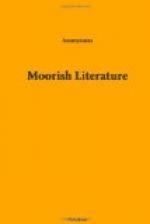Burned the Moor’s heart at once
with wrath, at once with passion’s flame,
To save the life and, more than life, the honor of his dame.
Straight to his feet he sprung and straight he drew his mighty sword,
And plunged into the robber crowd and uttered not a word.
No jousting game was e’er so brisk as that which then he waged;
On arm and thigh with deadly blow the slashing weapon raged;
Though certain was his death, yet still, with failing heart, he prayed
That till his lady could escape, that death might be delayed.
But, in the dark, a deadly stone, flung with no warning sound,
Was buried in his forehead and stretched him on the ground.
The breath his heaving bosom left and, from his nerveless hand,
The sword fell clattering to the ground, before that bloody band.
And when the damsel saw herself within those caitiffs’ power,
And saw the city mantled in the darkness of the hour,
No grief that ever woman felt was equal to her pain,
And no despair like that of hers shall e’er be known again.
Those villains did not see those locks, that shone like threads of gold;
Only the summer sunlight their wondrous beauty told.
They did not mark the glittering chain of gold and jewels fine,
That in the daylight would appear her ivory throat to twine.
But straight she took the scimitar, that once her lover wore,
It lay amid the dewy grass, drenched to the hilt in gore.
And, falling on the bloody point, she pierced her bosom through,
And Tartagona breathed her last, mourned by that robber crew.
And there she lay, clasping in death her lover’s lifeless face,
Her valor’s paragon, and she the glass of woman’s grace.
And since that hour the tale is told, while many a tear-drop falls,
Of the lovers of the vega by Antequera’s walls.
And they praise the noble lady and they curse the robber band,
And they name her the Lucretia of fair Andalusia’s land.
And if the hearer of the tale should doubt that it be true,
Let him pass along the mountain road, till Ronda comes in view,
There must he halt and searching he may the story trace
In letters that are deeply cut on the rocky mountain’s face.
To save the life and, more than life, the honor of his dame.
Straight to his feet he sprung and straight he drew his mighty sword,
And plunged into the robber crowd and uttered not a word.
No jousting game was e’er so brisk as that which then he waged;
On arm and thigh with deadly blow the slashing weapon raged;
Though certain was his death, yet still, with failing heart, he prayed
That till his lady could escape, that death might be delayed.
But, in the dark, a deadly stone, flung with no warning sound,
Was buried in his forehead and stretched him on the ground.
The breath his heaving bosom left and, from his nerveless hand,
The sword fell clattering to the ground, before that bloody band.
And when the damsel saw herself within those caitiffs’ power,
And saw the city mantled in the darkness of the hour,
No grief that ever woman felt was equal to her pain,
And no despair like that of hers shall e’er be known again.
Those villains did not see those locks, that shone like threads of gold;
Only the summer sunlight their wondrous beauty told.
They did not mark the glittering chain of gold and jewels fine,
That in the daylight would appear her ivory throat to twine.
But straight she took the scimitar, that once her lover wore,
It lay amid the dewy grass, drenched to the hilt in gore.
And, falling on the bloody point, she pierced her bosom through,
And Tartagona breathed her last, mourned by that robber crew.
And there she lay, clasping in death her lover’s lifeless face,
Her valor’s paragon, and she the glass of woman’s grace.
And since that hour the tale is told, while many a tear-drop falls,
Of the lovers of the vega by Antequera’s walls.
And they praise the noble lady and they curse the robber band,
And they name her the Lucretia of fair Andalusia’s land.
And if the hearer of the tale should doubt that it be true,
Let him pass along the mountain road, till Ronda comes in view,
There must he halt and searching he may the story trace
In letters that are deeply cut on the rocky mountain’s face.
TARFE’S TRUCE
“Oho, ye Catholic cavaliers
Who eye Granada day and night,
On whose left shoulder is the cross,
The crimson cross, your blazon
bright.
“If e’er your youthful hearts
have felt
The flame of love that brings
delight,
As angry Mars, in coat of steel,
Feels the fierce ardor of
the fight;
“If ’tis your will, within
our walls,
To join the joust, with loaded
reed,
As ye were wont, beneath these towers
The bloody lance of war to
speed;
“If bloodless tumult in the square
May serve instead of battle’s
fray,
And, donning now the silken cloak,
Ye put the coat of steel away;




